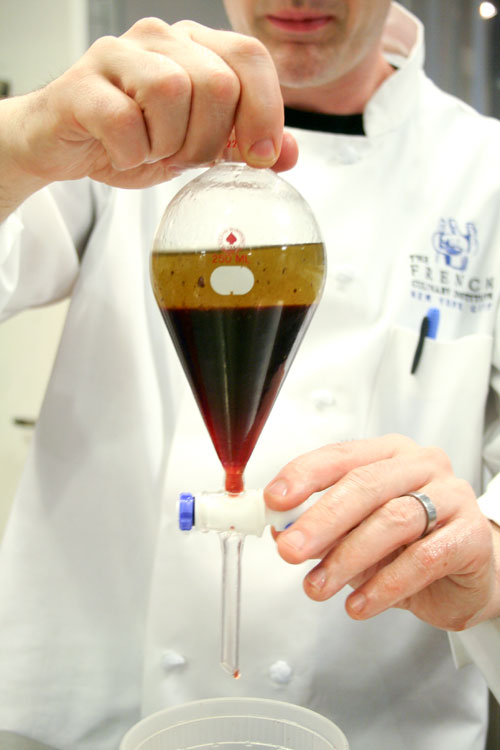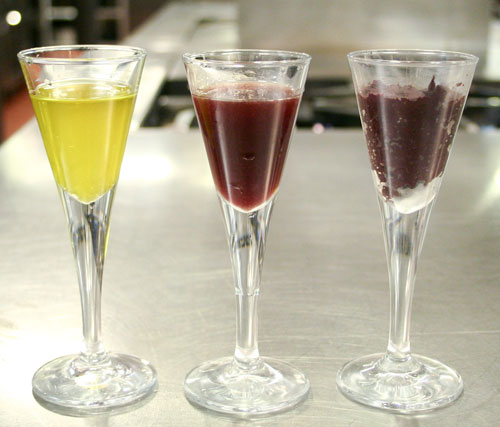posted by Dave Arnold
We think olive oil from cured olives is delicious. A professional olive oil taster would disagree. Let me explain:
We’ve been using our centrifuge to make cured olive oil. First we blend pitted olives (kalamata’s been our choice) in a Vita-Prep until they form a smooth paste; then we load the paste into centrifuge buckets and spin them at 4000 times the force of gravity for 20 minutes. While the olives are spinning they separate into 3 layers by density: a layer of olive oil at the top, followed by a solid layer of olive paste, sitting on a liquid layer of dense olive brine at the bottom. To separate the olive oil from the brine we use a piece of lab-glass called a separatory funnel. Don’t be without one. The olive brine would make a fantastic dirty martini. The olive paste makes a very meaty tapenade. Our favorite part, however, is the olive oil layer on top.

Olives straight out of the centrifuge: oil, paste brine. The paste and the brine get muddled in the bag, so now we just spin the olives directly in the centrifuge buckets, which yields a nice puck of tapenade.
We really, really, like the olive oil. It tastes just like kalamata olives. I was discussing this oil with Harold McGee (master blaster of the delicious science, see him here at the FCI April 22 and 23), who told me an interesting story:
In 2006 Cook’s Illustrated published an article rating extra virgin olive oils. Alexandra Kicenik Devarenne, an olive oil expert and instructor at UC Davis, read the article and was surprised by the results. She convened an expert olive oil tasting panel and re-tested the exact same oils. The results were astounding. The oils rated tops by Cook’s Illustrated were rated defective by the trained testers. Oils that fared badly in the Cook’s test were highly rated by the trained panel (Read about it here). What the hell?
Many of the oils that had done poorly in the Cook’s test, but were liked by professionals, were bitter. McGee told me that bitterness is an indication of polyphenols, a mark of quality — polyphenols prevent oxidation and rancidity. On the flip-side, many of the oils rated highly by Cook’s showed some rancidity. It turns out that we tend to like rancidity when we’re used to it. To illustrate, here’s a story about rancidity that will probably get us sued:
A packing company approached a large manufacturer of peanut-butter cups with a proposal for an oxygen-absorbing insert that prevented rancidity. The company test-marketed their peanut butter cups with this rancidity-reducing package. Customers balked. Turns out, people expected their peanut butter cups to taste a little rancid, and didn’t like them when they didn’t. Of course, those consumers didn’t know that they were selecting for rancidity, they were just choosing what they liked. Back to olive oil:
Another defect that the Cook’s panel liked was the taste of fermented olives. Fermented olive taste (pros call is fustiness) indicates that some olives had started to ferment before they were pressed. Trained olive oil professionals see this trait as a defect, because oil from those olives won’t last as long and was made with sub-optimal olives. Tasters who don’t know any better like the fermented taste, because it tastes more like olives than ‘good’ olive oils. Our centrifuge olive oil, made with 100 percent cured olives, takes that defect to the extreme.
Well, anyway, we like it.



As a chem student, I am really delighted by your use of the sep funnel. They are also great at defatting stocks and sauces.
That funnel looks great…. but how do you clean it?
Hi Kenneth T,
I just use soap and water. i bought one with a teflon stopcock so I wouldn’t have to worry about greasing the joint. You do have to loosen the stopcock before you put it away or the teflon will extrude and ruin itself.
Ha! I’ve been meaning to get a separatory funnel for the kitchen for years, but I’ve been too lazy. Thanks for the reminder.
One more property to mention in this context is the free fatty acid concentration in olive oil.
In excellent oil it is <0.4 %, but 2% and more are not uncommon. This correlates with a stronger "olive oil" taste but is considered a flaw by professionals.
Does that funnel just separate by density, somehow? Where can I get one…and stop making me buy stuff!!!
Hey Seth,
Yeah, it separates by density. What makes it so great id the steep angle and the neck just before the stopcock that lets you get a good clean break between the oil and the water. You can get one at chemglass or ace glass out of NJ.
I grew up on it! I actually trained in Davis and became a taster at one time for the COOC because I could pick up fusty oil in minute degrees but I actually liked the flavor. I was King Fusty and was worried something was wrong with me because I enjoyed oil that tasted like fermented olives.
Hilarious. You should hurry and get kingfusty@gmail.com (if it isn’t already taken).
Maybe a silly question, but does the oil tast in any way ‘seasoned’ from the brine.
I still remember I gave an instructor a near heart attack when I put salt in my French dressing after adding the oil instead of with the vinegar at the beginning, so I know oil and salt are not best friends. But then again many of the stuff drilled in my head turns out to be complete nonsense.
Hey Auldo,
It is definitly seasoned but I don’t think it is salty. It is an interesting question.
This is quite interesting. I know that much of the chocolate we get here in the US (at least the macro, Hershey’s stuff) has butyric acid added to it, which is the foul smelling stuff when butter goes rancid as well… so this isn’t the first time I’ve heard of a connection between North American tastes and food spoilage. Cool experiment, and I agree on the use of the sep funnel. Don’t see enough of that in the kitchen. They’re a bitch to clean though.
So is that why Hershey’s tastes like there is puke in it? (I’m not the only one who has made this observation.) Not growing up in the US, I was perplexed as to why people here love it so much.
I have just “discovered” this blog and I’m intrigued with all the gadgets you use: centrifuge, sep funnel, etc. Do you have a post or category that showcase these things?